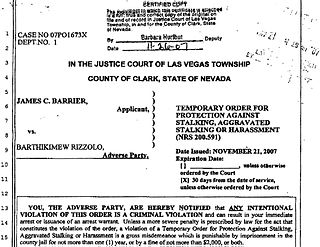Related Research Articles

Marriage, also called matrimony or wedlock, is a culturally recognised union between people, called spouses, that establishes rights and obligations between them, as well as between them and their children, and between them and their in-laws. It is considered a cultural universal, but the definition of marriage varies between cultures and religions, and over time. Typically, it is an institution in which interpersonal relationships, usually sexual, are acknowledged or sanctioned. In some cultures, marriage is recommended or considered to be compulsory before pursuing any sexual activity. A marriage ceremony is called a wedding.
Divorce is the process of terminating a marriage or marital union. Divorce usually entails the canceling or reorganizing of the legal duties and responsibilities of marriage, thus dissolving the bonds of matrimony between a married couple under the rule of law of the particular country or state. Divorce laws vary considerably around the world, but in most countries, divorce requires the sanction of a court or other authority in a legal process, which may involve issues of distribution of property, child custody, alimony, child visitation / access, parenting time, child support, and division of debt. In most countries, monogamy is required by law, so divorce allows each former partner to marry another person.
Adultery is extramarital sex that is considered objectionable on social, religious, moral, or legal grounds. Although the sexual activities that constitute adultery vary, as well as the social, religious, and legal consequences, the concept exists in many cultures and is similar in Christianity, Judaism and Islam. A single act of sexual intercourse is generally sufficient to constitute adultery, and a more long-term sexual relationship is sometimes referred to as an affair.
Legal separation is a legal process by which a married couple may formalize a de facto separation while remaining legally married. A legal separation is granted in the form of a court order. In cases where children are involved, a court order of legal separation often makes child custody arrangements, specifying sole custody or shared parenting, as well as child support. Some couples obtain a legal separation as an alternative to a divorce, based on moral or religious objections to divorce.

A wife is a female partner in a continuing marital relationship.
Annulment is a legal procedure within secular and religious legal systems for declaring a marriage null and void. Unlike divorce, it is usually retroactive, meaning that an annulled marriage is considered to be invalid from the beginning almost as if it had never taken place. In legal terminology, an annulment makes a void marriage or a voidable marriage null.

A restraining order or protective order is an order used by a court to protect a person, object, business, company, state, country, establishment, or entity, and the general public, in a situation involving alleged domestic violence, child abuse, assault, harassment, stalking, or sexual assault. In the United States, every state has some form of domestic violence restraining order law, and many states also have specific restraining order laws for stalking and sexual assault.
No-fault divorce is a divorce in which the dissolution of a marriage does not require a showing of wrongdoing by either party. Laws providing for no-fault divorce allow a family court to grant a divorce in response to a petition by either party of the marriage without requiring the petitioner to provide evidence that the defendant has committed a breach of the marital contract.

Divorce in Islam can take a variety of forms, some initiated by the husband and some initiated by the wife. The main traditional legal categories are talaq (repudiation), khulʿ, judicial divorce and oaths. The theory and practice of divorce in the Islamic world have varied according to time and place.. Historically, the rules of divorce were governed by sharia, as interpreted by traditional Islamic jurisprudence, though they differed depending on the legal school, and historical practices sometimes diverged from legal theory. In modern times, as personal status (family) laws were codified, they generally remained "within the orbit of Islamic law", but control over the norms of divorce shifted from traditional jurists to the state.

Marriage in ancient Rome was a strictly monogamous institution: a Roman citizen by law could have only one spouse at a time. The practice of monogamy distinguished the Greeks and Romans from other ancient civilizations, in which elite males typically had multiple wives. Greco-Roman monogamy may have arisen from the egalitarianism of the democratic and republican political systems of the city-states. It is one aspect of ancient Roman culture that was embraced by early Christianity, which in turn perpetuated it as an ideal in later Western culture.

A husband is a male in a marital relationship, who may also be referred to as a spouse or partner. The rights and obligations of a husband regarding his spouse and others, and his status in the community and in law, vary between societies and cultures, and have varied over time.

Grounds for divorce are regulations specifying the circumstances under which a person will be granted a divorce. Each state in the United States has its own set of grounds. A person must state the reason they want a divorce at a divorce trial and be able to prove that this reason is well-founded. Several states require that the couple must live apart for several months before being granted a divorce. However, living apart is not accepted as grounds for a divorce in many states.
Ligamen is, in Roman Catholic canon law, an existing marriage tie, which constitutes an impediment to the contracting of a second marriage.
The relationship between religion and divorce is complicated and varied. Different religions have different perceptions of divorce. Some religions accept divorce as a fact of life, while others only believe it is right under certain circumstances like adultery. Also, some religions allow remarriage after divorce, and others believe it is inherently wrong. This article attempts to summarize these viewpoints of major world religions and some important traditions regarding divorce in each faith.
This article is a general overview of divorce laws around the world. Every nation in the world allows its residents to divorce under some conditions except the Philippines and the Vatican City, an ecclesiastical sovereign city-state, which has no procedure for divorce. In these two countries, laws only allow annulment of marriages.

The Matrimonial Causes Act 1857 was an Act of the Parliament of the United Kingdom. The Act reformed the law on divorce, moving litigation from the jurisdiction of the ecclesiastical courts to the civil courts, establishing a model of marriage based on contract rather than sacrament and widening the availability of divorce beyond those who could afford to bring proceedings for annulment or to promote a private Bill. It was one of the Matrimonial Causes Acts 1857 to 1878.

Marriage in Scotland is recognised in the form of both civil and religious unions between individuals. Historically, the law of marriage has developed differently in Scotland to other jurisdictions in the United Kingdom as a consequence of the differences in Scots law and role of the separate established Church of Scotland. These differences led to a tradition of couples from England and Wales eloping to Scotland, most famously to marry at border towns such as Gretna Green. The legal minimum age to enter into a marriage in Scotland is sixteen years and does not require parental consent at any age.
Grounds for divorce are regulations specifying the circumstances under which a person will be granted a divorce. Adultery is the most common grounds for divorce. However, there are countries that view male adultery differently than female adultery as grounds for divorce.
In England and Wales, divorce is allowed on the ground that the marriage has irretrievably broken down. The Matrimonial Causes Act 1973 specifies that the marriage may be found to have irretrievably broken down if one of the following is established:
The Family Proceedings Act 1980 is the Act that governs divorce in New Zealand. The New Zealand Parliament has exclusive jurisdiction to regulate the law of marriage and divorce.
References
- 1 2 Bond et al. (2007) 7.4.19
- ↑ Chisholm, Hugh, ed. (1911). . Encyclopædia Britannica . 7 (11th ed.). Cambridge University Press. p. 144.
- ↑ Family Procedure Rules SI1991/1247, r.2.7(1)
- ↑ "Divorce Information". Thursday, 22 April 2021
- ↑ The Law Society (2006).